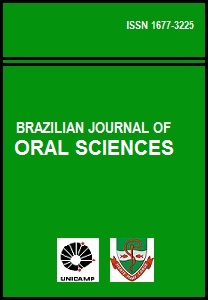Abstract
Aim: To evaluate the management adopted by orthodontists regarding root resorption caused by orthodontic treatment, relating it to their time of experience and the applicable legal norms. Methods: the study population consisted of 56 orthodontists from the city of Belo Horizonte (Minas Gerais State), and the tool to collect the data was a questionnaire with open and closed questions. Data were subjected to descriptive analysis. The association between the variables was analyzed by the chi-square test with significance level of 5%. Results: 57.6% of professionals temporarily interrupt the treatment; in the prevention and/or control, most professionals (80.4%) perform initial and periodical radiographs (every six months). Among the professionals with less than 5 years of experience as a specialist, 88.9% usually make periodic radiographic control; 100% affirmed to file the documents. No significant difference was found between dentists with different times of experience regarding the practice of archiving the documents (p = 0.271). Among those with 5-15 years of experience, 77.4% perform periodic radiographic control and 45.2% had already detected root resorption. Among those with more than 15 years of experience, 71.4% usually perform the periodic radiographic control, and 85.7% had already faced some case of root resorption in the clinical practice. Conclusions: Although most orthodontists adopt a correct management facing the occurrence, prevention and control of root resorption associated with orthodontic treatment, the majority are unaware about existing legislation in our countryThe Brazilian Journal of Oral Sciences uses the Creative Commons license (CC), thus preserving the integrity of the articles in an open access environment.
Downloads
Download data is not yet available.

